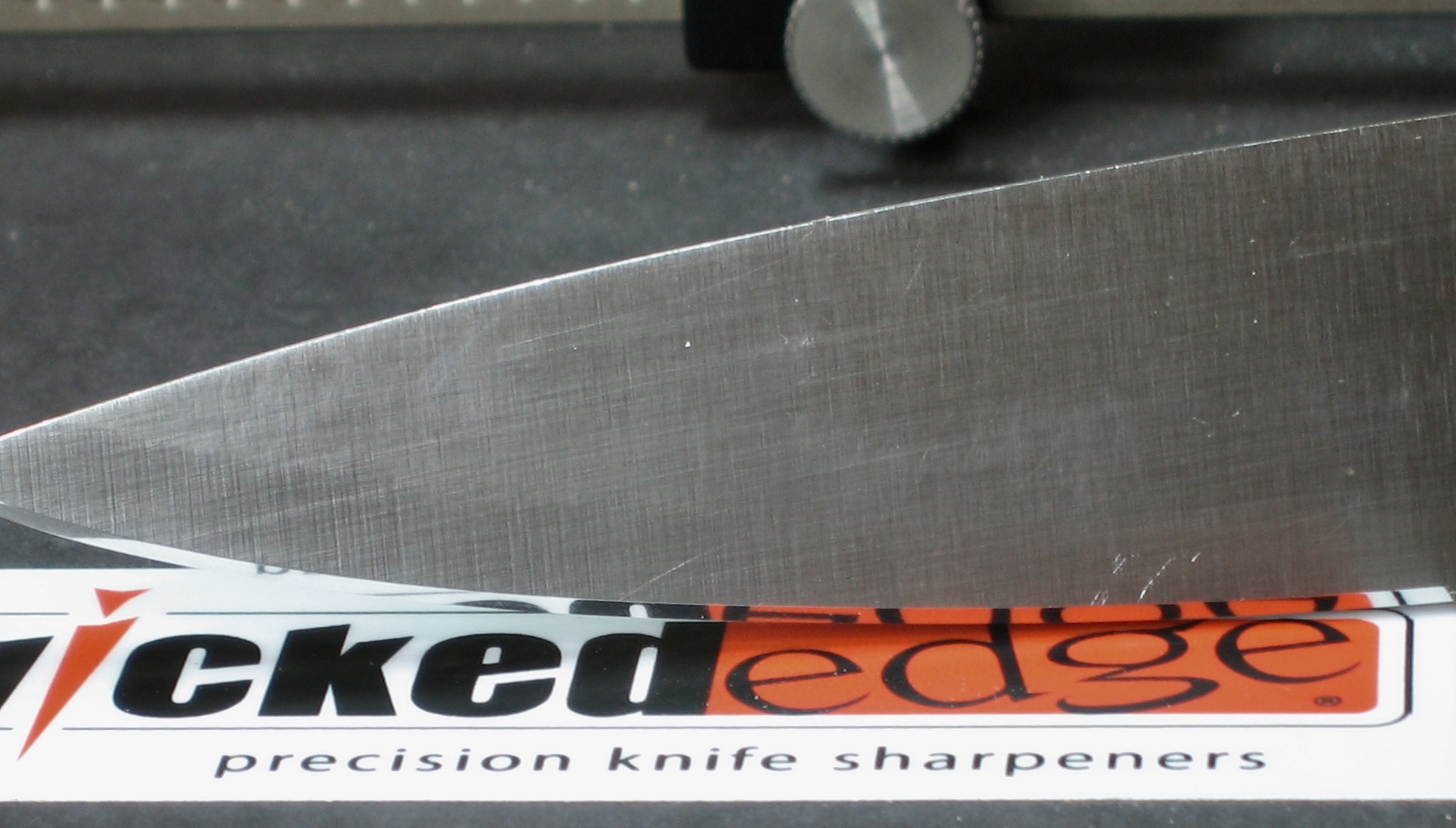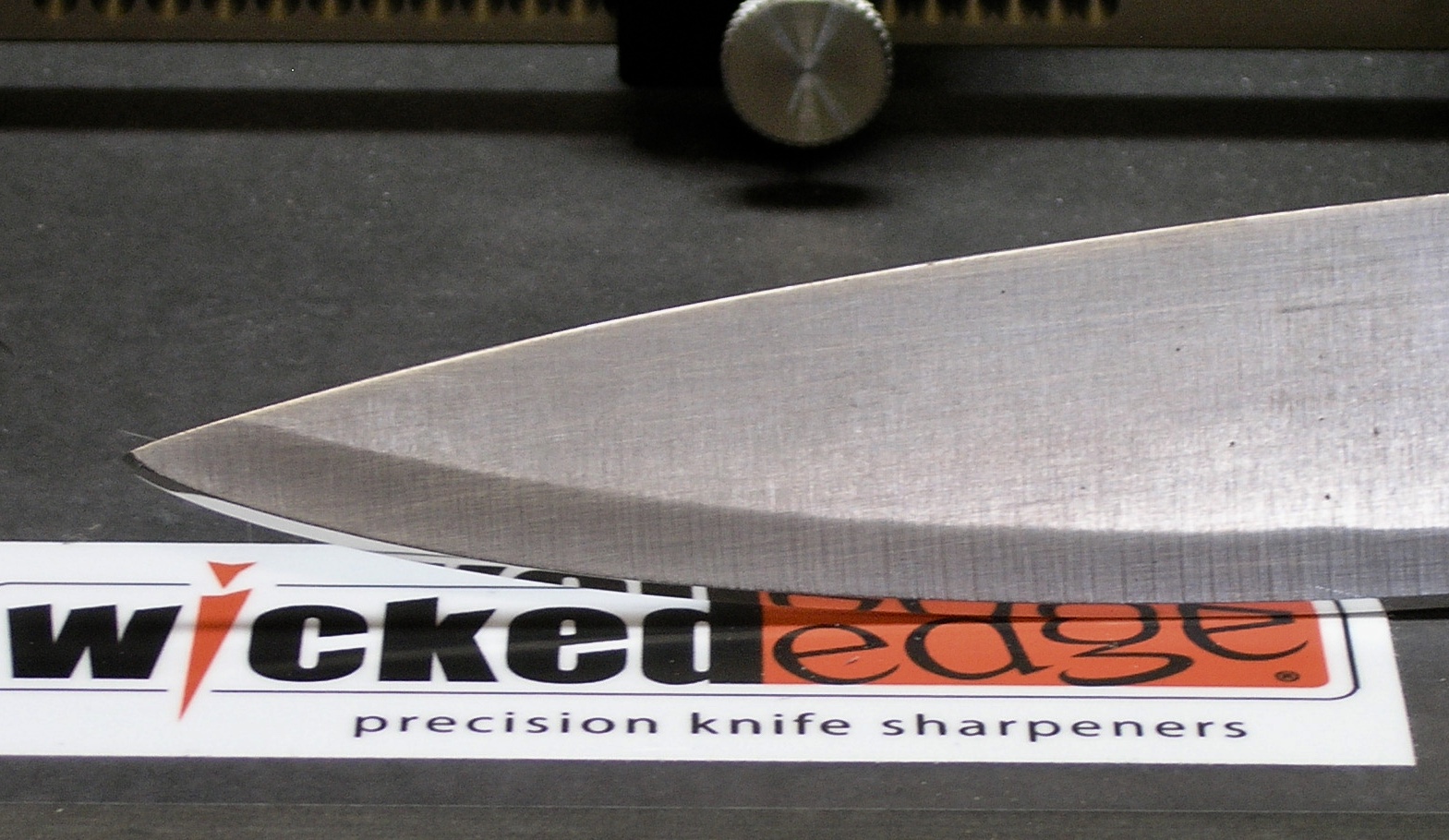Bevel Angle Change Question…
Recent › Forums › Main Forum › Getting Started › Bevel Angle Change Question…
- This topic has 17 replies, 4 voices, and was last updated 05/03/2022 at 3:21 pm by
Mikedoh.
-
AuthorPosts
-
01/16/2019 at 10:08 am #49074
I just changed the bevel angle on a cleaver with the WE and it took quite some time with the 100 stones. Is it ok or even advisable to use a Tormek or equivalent to change the bevel angle, then proceed to the WE? Will the slight hollow grind be just as hard to remove as changing the bevel angel?
01/16/2019 at 10:16 pm #49075I use my Tormek to profile and finish on my WE all the time. The hollow bevel from the Tormek is so insignificant that I’ve not seen an issue.
5 users thanked author for this post.
01/17/2019 at 7:55 am #49079Hogdog, thanks. Just what I needed to know. It’s a bit of a pain to haul out the “Tank”, as I call it, but as I suspected and you confirm, it should save me some time and effort and the cost of buying more stones. I knew the hollow grind was very shallow, however I wasn’t sure if it might cause another issue for the WE. Thanks.
1 user thanked author for this post.
01/22/2019 at 12:57 pm #49124Well, I used the Tormek to get a 20* hollow ground bevel on this thrift store knife. It took about 2 passes per side, to establish the new bevel and go from super dull, to burrs on both sides. From there, I went straight to the WE and set it to 20 dps. I blacked the bevel, took a swipe with 800 grit and it turned out to be a near perfect degree match, with only a very slight amount of hollow. I started with the 400 grit stones and wiped out the black after just a few strokes. Boy, did that save me a ton of strokes. I just have to get over the trouble of taking out the Tormek and setting it up. Here’s a pic of the hair-splitting finished edge…
Attachments:
You must be logged in to access attached files.
4 users thanked author for this post.
01/23/2019 at 3:03 am #49132Anytime you face a situation where there’s a lot of steel to remove, do not hesitate to take the mindset that doing so one stroke at a time is simply not reasonable. Any of the driven systems, whether a WorkSharp, a Tormek, a bench grinder or one of the belt sanders will save you hours and hours of tedious work as well as unnecessary wear on your diamonds. Pick a system you think will do the best job at profiling at your target angle and go with it. Your WE won’t care how the starting bevel got there; it’ll simply do what it does best – finish the bevel with a precision, wicked edge.
Cleavers, at least those I’ve worked on, have extremely heavy bevel shoulders, with bevels five to ten times as wide as the typical kitchen/cook’s knives. This translates into very large amounts of steel to be removed, even in touch-ups if you find a significant nick in the edge.
3 users thanked author for this post.
01/23/2019 at 9:43 am #49133Thanks for the advice and it is well taken. I was a little hesitant with the hollow grind, but now I see it’s no problem. I expect I’ll be using the Tormek for that purpose, rather than buying the coarser stones.
I see why folks would use the Tormek for all of their sharpening, if for nothing else but the speed. I’m sure the properly ground and stropped edge would be plenty sharp for lots of folks. That said, when you see the results of the WE edge, it’s night and day.
01/23/2019 at 10:28 am #49134Do you have the Tormek 4000 grit Japanese style stone?
01/23/2019 at 10:39 am #49135No I don’t. If I could have gotten the Tormek to work to my satisfaction, considering the limitations of the original stone, then I was going to purchase more stones for more refined edges. As it was, “polishing” the one wheel to a 1k grit, then stropping, never gave me the consistent, refined edge I wanted. Even if you stopped your WE sharpening at 1k stones, then stropped, it would be a far better edge than that of the Tormek.
So, in answer to your question, I chose not to go with higher grade Tormek stones and opted to put the $ into my WE, which I am loving, the more I use it.
1 user thanked author for this post.
01/23/2019 at 2:52 pm #49144Ok…just because…I went back and hit the edge with 6 and 3 micron films, then stropped again. It really did improve the scratches. Don’t know if you can tell by my poor pics, but take a look…
Attachments:
You must be logged in to access attached files.
1 user thanked author for this post.
01/28/2019 at 6:15 am #49203For those of you that can’t afford or want to lug out a secondary sharpening system or have room for grinders etc . . .
I find the WE 50/80 stone set is a Godsend and a huge time-saver when reprofiling for removing metal fast especially on beater type knifes. Just use light pressure so as not to impart deeper scratches. I find the next stone set 100/200 removes the scratches quickly that the 50/80 leaves behind. When I get tired of too many strokes especially on the harder steels I whip out those 50/80’s and I’m off to the races!
4 users thanked author for this post.
03/14/2022 at 2:48 pm #57677Has anyone tried mounting a couple of pieces of a single-(first-) cut bastard file to a set of blank paddles? I’ve used a good, sharp single-cut bastard for re-profiling blades and sharpening tools in the past, and used properly, it leaves a very nice edge for little effort.
03/15/2022 at 8:29 am #57685That is actually are very good idea. The 50/80 stone rips the crap out of the steel, I bet a file might take a bit longer but be less destructive with softer steel. Not experienced enough to guess what it would do to hard steel. I am guessing there are a few members here who may have tried this.
03/15/2022 at 11:19 am #57687It sounds like a good idea and I sure hadn’t thought of it. I think that maybe it might not work for some percentage of blades which are too hard. When hardening blades, the one basic test used to tell if you’ve been successful is to touch a file to the edge. If the file doesn’t “bite,” you’ve got a hard blade. Now the question is do you draw the hardness down enough during tempering to change that. In any case, I’m sure that it’d be worth a try.
I use single-cut mill files for sharpening axes and hatchets, using a draw-filing technique. Draw filing has the file being pulled toward you parallel to the edge and with the teeth at some angle relative to the surface you are working – usually close to 90 degrees. Here, the file is not moving sideways, relative to the edge. The idea being to leave a smooth surface and not leave deep grooves where the ends of the file teeth pass over the surface. Talk about a toothy edge! How about maybe three teeth?! You can actually make a knife edge quite sharp this way. This technique doesn’t seem to fit the sweeping configuration of the Wicked Edge and I think scratches left by the file teeth (if they appear at all) would be really difficult to remove.
That having been said, I love to experiment and I might just give it a try. I’m thinking a Youtube video is in my future with both vertical and longitudinal configurations. Thanks for the idea, Timm!
03/15/2022 at 5:59 pm #57690Yeah, TC, that sounds like the same way I was taught to use a file for sharpening a tool. I’m trying to wrap my head around how to mount a file to a paddle so the file moves with the teeth at 45-90 degrees to the edge of the bevel, while keeping the file tilted at the proper and consistent angle.
I have some knives that can easily be filed. I have some that whittle the teeth off the file!
04/23/2022 at 3:29 am #57847Hi Timm:
Well, I’ve done it. File mounted on Wicked Edge system with at least some success! Video to come soon.
1 user thanked author for this post.
-
AuthorPosts
- You must be logged in to reply to this topic.

